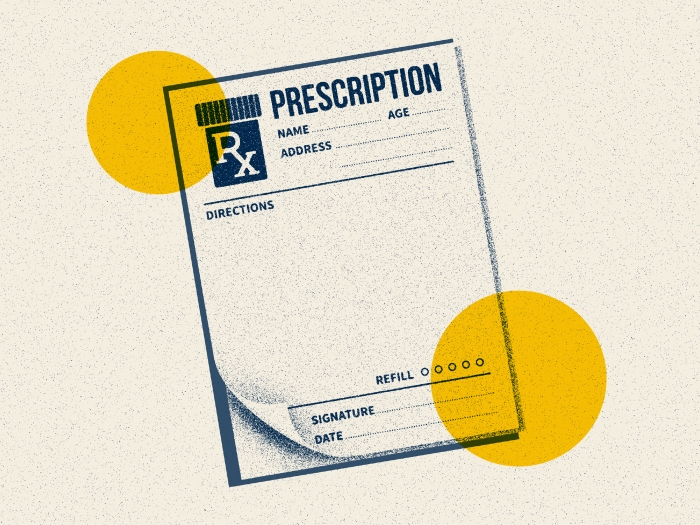U-M research suggests coping techniques can help patients lead fuller lives — with or without complete pain relief.
7:00 AM
Author |

People who adapt to their chronic pain and focus on pursuing life goals — rather than focusing solely on eliminating pain — may improve their quality of life, use less pain medicine and help counteract the epidemic of opioid abuse.
LISTEN UP: Add the new Michigan Medicine News Break to your Alexa-enabled device, or subscribe to our daily audio updates on iTunes, Google Play and Stitcher.
Such "pain acceptance" can allow patients to endure discomfort while engaging in and living life more fully, a new study in the Clinical Journal of Pain suggests.
But that hasn't always been widely practiced.
"Typically, the treatment approach has been to try to help patients gain control of their pain, in an attempt to minimize or even take away the pain," says Anna Kratz, Ph.D., an associate professor in the Department of Physical Medicine and Rehabilitation at the University of Michigan and the study's lead author.
It may involve taking medications or nonsteroidal anti-inflammatory drugs such as Advil. Or it could mean engaging in psychological interventions aimed at reducing pain severity.
Because of the country's overreliance on opioids — which include prescription medicines such as OxyContin, Vicodin, morphine and fentanyl — finding a safer alternative to help people with chronic pain is crucial, Kratz says.
An estimated 5 million to 8 million Americans take opioids to manage their chronic pain. In 2016, more than 40 percent of opioid overdose deaths, or 46 people a day, involved pills that were legally prescribed, the U.S. Department of Health and Human Services reports.
Which is why a shift in thinking could save lives.
Says Kratz: "Here comes this idea from psychologists that we should be helping people with chronic pain come to accept that they may potentially never completely get rid of their pain and, instead of putting a spotlight on the pain, get them to live a fuller life — regardless of whether their pain improves."
A bitter pill to swallow
The premise of pain acceptance doesn't always go over well.
"People in pain don't always want to hear that they should learn to accept pain" because it often extinguishes their hope for a cure, Kratz says. "That's hard to hear."
MORE FROM MICHIGAN: Sign up for our weekly newsletter
That's when Kratz would point to the science behind pain acceptance.
She studies people with spinal cord injuries who often say their chronic pain is "severe" or "excruciating" and report that pain medication is ineffective. Her findings show that patients who embrace pain acceptance relied less on medications.
Those who focus on living a full life rather than eliminating pain appear to be less likely to reach for a pill bottle to solve their pain problem.
"What is especially interesting is that the association between being more accepting of pain and using fewer pain medications was above and beyond the effects of how intense and widespread their pain was," Kratz says.
"That means people who are more accepting aren't reaching less for the pills just because their pain is lower."
In addition to a fuller and more active life, which is supported by the research from Kratz and others, people who accept pain may also enjoy the benefits of fewer side effects that frequently go along with pain medications.
Among them: kidney failure, toxicity-related stomach upset, gastrointestinal bleeding, dizziness, unsteadiness, dry mouth, swelling, cognitive dysfunction and, in the case of opioids, addiction.
"When you eliminate those side effects, it is likely your quality of life does go up," Kratz says.
Embracing pain acceptance
Getting to the point of pain acceptance may take time.
Chronic pain patients can draw encouragement from family members, who may remind them they've tried everything to eliminate pain and can help them enjoy life rather than dwell on their pain, Kratz says.
SEE ALSO: Chronic Pain Therapy Group Eases Coping, Conversation
It's also crucial to make sure a patient's medical team includes a pain psychologist.
Because chronic pain often results in frustration, depression, anxiety, conflict or isolation, and poor health behaviors, a pain psychologist offers strategies to help cope with the pain and negative feelings and promote healthy outlooks — including pain acceptance.
"You'd be surprised to hear how many people don't realize there are pain psychologists available," Kratz says.
And the treatment they provide often can be as effective as any medication, she notes.
"As an added benefit, seeing a psychologist has no side effects, is often cheaper than medical options, and in the total equation, the patient comes out ahead, in my opinion," says Kratz, who encourages checking whether your insurance covers these services.
To access a self-management website developed by Michigan Medicine faculty and aimed at helping people manage pain, visit fibroguide.med.umich.edu.
To make an appointment with a Michigan Medicine pain psychologist, call 734-763-6501 or 734-615-7246.

Explore a variety of health care news & stories by visiting the Health Lab home page for more articles.

Department of Communication at Michigan Medicine
Want top health & research news weekly? Sign up for Health Lab’s newsletters today!





